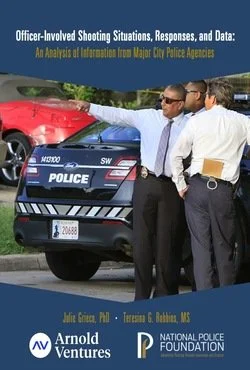Officer-Involved Shooting Situations, Responses, and Data: An Analysis of Information from Major City Police Agencies
By Julie Grieco and Teresina G. Robbins
Several high-profile officer-involved shootings (OIS) in 2014 and 2015 stimulated a national debate and exposed the absence of reliable national data on police use of deadly force. To begin exploring this issue, the Major Cities Chiefs Association (MCCA) first asked their members to provide the number of OIS for their agencies for the years 2005-2015. While helpful in understanding the trends and frequency of these incidents, this data alone provides no insight into the circumstances of the encounters between officers and members of the public. To help develop a better understanding of these interactions, MCCA and the National Policing Institute (NPI) entered into a partnership in 2015 to collect more detailed OIS data. The partnership had two primary objectives. The first was to provide a basis for a more accurate and reliable estimate of firearm use by police officers in major cities. The second, covered in this report, was to provide better insight into OIS situations and, through the analysis of the data, improve officer safety and accountability. After developing a tool and a process, OIS data collection was launched in late March 2015. The NPI and the MCCA have developed three executive summaries on this project to share the information with practitioners on 1006 cases involving 1605 officers in 47 MCCA US agencies for the years 2015 to 2017. The first focuses on OIS incident characteristics. The second presents the findings of an analysis of officer-involved shooting incidents in the major cities. It looks at factors involved such as location, officer and suspect characteristics,
-
injuries, agency response to OIS, and issues in OIS data collection. The third is a broader discussion of OIS incidents, how their data are captured within law enforcement, and the gaps in our understanding of these encounters.
Alexandria, VA: Policing Institute, New York: Arnold Ventures, 2019. 65p.


